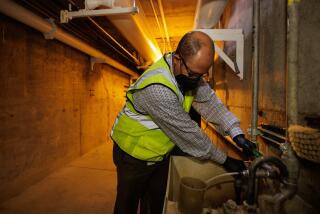Meese Says He’d Like Drug Tests on Everyone Arrested : Sees No Conflict With Rights
- Share via
WASHINGTON — Atty. Gen. Edwin Meese III, reinforcing the Administration’s assault against drug users, said today that he would “like to see the day” when every person arrested is subjected to a urine test.
“I would like to see the day where every person arrested is subjected to a urine test, which can then be used for several purposes, first of all to decide whether or not that person is eligible” for release, Meese said.
Meese made his remarks during an address before the National Conference on Crime sponsored by the U.S. Conference of Mayors. In response to reporters’ questions after his remarks, Meese said his idea is “certainly . . . a part of our user accountability strategy that is being developed at the present time.”
Asked whether such a policy would conflict with individual constitutional rights, Meese firmly said, “No.”
“If they have drugs in their system at the time of arrest, then a condition of pretrial release ought to be that they continue being subject to random drug testing during the time they’re out on bail . . . so that they can in fact be dissuaded by that device . . . while awaiting trial,” Meese said of people arrested by authorities.
U.S. ‘Policy Isn’t a Policy’
And he said that “if drugs are a part of the problem,” that ought to be taken into account during sentencing.
But the nation’s mayors and law enforcement officials, frustrated by what they see as federal rhetoric rather than dollars, want a national anti-drug strategy that includes a flow of money to city governments.
After Meese outlined the Administration’s anti-drug programs, including interdiction and eradication efforts in countries that supply drugs, Providence, R.I., Mayor Joseph Paolino pointedly told Meese that the mayors feel that “the policy of the federal government isn’t a policy.”
New Orleans Mayor Sidney J. Barthelemy argued to Meese that the federal government should appoint a drug czar whose sole responsibility is to direct the attack on illicit narcotics trafficking and use.
Barthelemy later told a reporter that “there are so many things” the attorney general is “dealing with and his time is divided.”
Meese is “saying that they’ve got it all under control, but on the local level we don’t see any national strategy, we don’t see anybody coordinating the effort,” said the New Orleans mayor.
“There was much fanfare associated with the declaration of the drug war here in Washington, but there was not much federal money to back the war on our streets, in our clinics or our schools,” Mayor Richard Berkley of Kansas City, Mo., president of the conference, told the opening session Monday.
Rangel Vows ‘Close Look’
Berkley said that the original appropriation for the war on drugs was $687 million but that a year later “only a small fraction of that funding had actually reached the cities.”
“For the second year of the drug war, the Administration proposed just $100 million for drug education and no funding for either law enforcement or treatment,” he said.
And the logjam in passing the money down to what everyone calls “the front lines” of the war on illegal drugs continues, he said.
Conference officials said direct grants to the cities can be expected to be a centerpiece in the mayors’ own anti-drug strategy and Rep. Charles B. Rangel (D-N.Y.), chairman of the House Select Committee on Narcotics Abuse and Control, said he will take “a close look” at proposals for direct funding.
“There is something wrong with a war strategy that cuts off the guns and ammunition to the troops on the front line,” he said.
More to Read
Sign up for Essential California
The most important California stories and recommendations in your inbox every morning.
You may occasionally receive promotional content from the Los Angeles Times.










